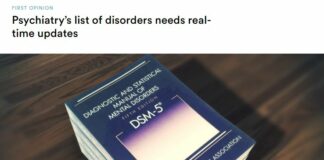Tag: DSM-V
Psychiatry’s Cycle of Ignorance and Reinvention: An Interview with Owen Whooley
Ayurdhi Dhar interviews sociologist Owen Whooley about psychiatry's stubborn perseverance in the face of recent DSM embarrassments and the failures of the biomedical model.
Minimal Evidence for Disruptive Mood Dysregulation Disorder in Childhood
Researchers offer a critical take on the inclusion of the Disruptive Mood Dysregulation Disorder in the DSM-V.
“Psychiatry’s List of Disorders Needs Real-Time Updates”
In a First Opinion piece for STAT, Michael First argues that a digital DSM should allow updates between editions. The American Psychiatric Association (APA)...
Psychiatric Ethics
When psychiatrists conduct "diagnostic" assessments on public figures, they are drawing attention to the fact that psychiatry's "diagnostic" system is more like a children's matching test than a genuine medical nosology. They are drawing attention to the fact that the Emperor has no clothes. And we all know where that leads.
“An Instant Cure”
In a tongue-in-cheek essay, a psychology professor laments that his diagnosis of histrionic personality disorder has now been removed from the DSM-V, the official...
Finding Clarity Through Clutter
For the last three years, I have been working with people, labeled "hoarders," who have become overwhelmed by their possessions in their homes. This has been some of the most interesting, challenging and thought-provoking work I have ever done. It is also an area that, I think, highlights all of the issues that challenge us in helping people who feel overwhelmed, for whatever reason.
In Search of an Evidence-based Role for Psychiatry
A dilemma for all of us who are struggling to broaden our understanding of human distress beyond simplistic, pessimistic, bio-genetic ideology, and to improve our mental health services accordingly, is whether or not to soften our criticisms of psychiatry in the hope of reaching those psychiatrists whose minds are not totally closed. But doing so rests on the assumption that change can come from within the profession. For the last few decades examples of that are few and far between.
Rise in Psychiatric Prescriptions With NOS Diagnosis
A “not otherwise specified” (NOS) diagnosis is often used when an individual may have some symptoms related to a psychiatric diagnosis but does not meet enough criteria to warrant a particular diagnosis. A new study, published online ahead of print in Psychiatric Services, reveals that the proportion of mental health visits resulting in such NOS diagnoses rose to nearly fifty percent, and that these diagnoses do not result in more conservative psychiatric drug prescriptions.












